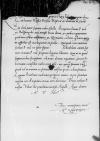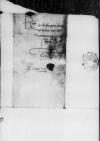Letter #6352
Sigismund II Augustus Jagiellon to Ioannes DANTISCUSVilnius, 1546-08-30
| received 1546-09-06 Manuscript sources:
| ||||
Text & apparatus & commentary Plain text Text & commentary Text & apparatus Excerpts concerning Dantiscus' travels
Reverendissimo in Christo Patri, domino
Reverendissime in Christo Pater, sincere nobis dilecte.
Accepimus cf.
Schedulam animo sincero et manu Paternitatis Vestrae scriptam legimus libenter. Qua in re quod superioribus scripsimus, id nunc demum repetimus iura et libertatem cuiuslibet nobis curae esse nec quicquam fecimus umquam, quod vel in minima re sententia paper damaged⌈[ia]ia paper damaged⌉e nostrae priori adversaretur.
Legatos Pruthenos audiemus pergrato animo et pro facultate nostra iuri et aequitati eorum non deerimus.
Bene valeat Paternitas Vestra.
Ex commissione sacrae maiestatis regiae propria


 BCz, 1601, p. 516
BCz, 1601, p. 516